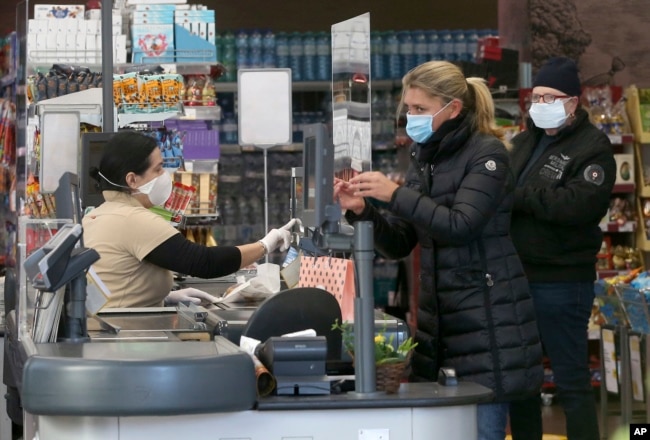Chicken with salmonella bacteria can make you sick. Other foods with E. coli bacteria or noroviruses can also make you sick. So why are health officials not warning people about eating food contaminated with the new coronavirus?
The answer has to do with the way different organisms make people sick.
The U.S. Centers for Disease Control and Prevention (CDC) says viruses and germs attach to tissues to cause illnesses. Respiratory viruses like COVID-19 usually attach to cells in places like people’s lungs. But germs like norovirus and salmonella can survive the acid found in stomachs. They then multiply after attaching to cells inside the organ.
The CDC and other experts note that they are still studying the new coronavirus. They say there is no evidence yet that COVID-19 sickens people through their stomachs. However, the virus has been found in the waste of infected people.
The germs also spread differently.
Viruses like the flu and COVID-19 spread mainly through person-to-person contact and air droplets from coughing or sneezing. Germs that make people sick through food cause illnesses like diarrhea. In some cases, germs found in human waste can travel from people’s hands to whatever else they touch.

Supermarket employees and customers wear protective masks in a shop in Vienna, Austria, Wednesday, April 1, 2020.
Experts say that is why it is so important for food workers to stay home when they are sick with digestive illnesses. Otherwise, they could end up sickening lots of people.
Experts say the biggest risk related to food and COVID-19 is contact with other people and workers in food stores. Stores are now limiting the number of people they let in. They are asking customers to practice social distancing and using tape to mark how far apart people should stand.
The new coronavirus can survive on some surfaces. Experts say to keep your hands to yourself as much as possible and to not touch your face when shopping. The CDC suggests washing your hands after unpacking your groceries at home.
It may also be harder for viruses to survive on food itself.
Alison Stout is an expert in infectious diseases and public health at Cornell University. She told the Associated Press that “the chances of anything surviving or coming out of [food] are small.”
The CDC notes that it is not known whether the germs found in human waste can actually sicken someone. Stout said the coronavirus being found in human waste is not likely a sign of its ability to survive in the digestive system.
Words in This Story
diarrhea – n. an illness that causes you to pass waste from your body very frequently and in liquid rather than solid form
digestive – adj. relating to or functioning in the body's process of changing food into simpler forms that can be taken up and used
respiratory – adj. relating to the act or process of breathing
salmonella – n. a kind of bacteria that is sometimes in food and that makes people sick